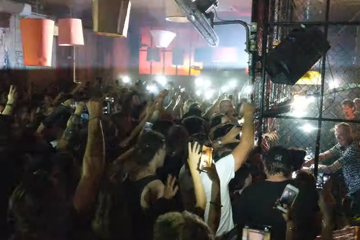Today’s announcement of Universal Music’s $775 million takeover of Downtown Music Holdings is a significant and seismic event for recorded music as distributors CD Baby and Fuga move from the 100% indie column to the majors.
It’s not a surprise, nor is it a slight on either party in the deal. Justin Kalifowitz and his team at Downtown built an independent powerhouse that competed globally with the major label juggernauts, and if this is their payday, then more power to them. For Universal, it’s a smart business move. If the most profitable move you can make is owning the market, then why wouldn’t you? The construct of neo-liberal capitalism wouldn’t have it any other way, and it’s a great deal for shareholders.
But is it good for music?
For the last two decades, we’ve watched as we’ve gone from selling CDs in stores, constrained by the physical nature of both business and the product itself, but then, digital came along. The entire world watched as the music industry “crumbled” and artists were liberated! They no longer needed to be constrained by their multinational overlords, and the public could finally listen to whatever they liked, not whatever the industry wanted.
Indie labels could thrive in this new world, where the music they were creating could find a market without the help of pesky things like A&R and marketing, which were holding their art back.
Don't miss a beat with our FREE daily newsletter
Fast forward to 2024, and a cascade effect of happenings has come to pass, and it seems that liberation was short-lived. We’re seeing it outside of music as the public wakes up to the reality that Coles and Woolworths can now decide overnight that a bag of cheese is $11 instead of $7, and there isn’t a goddamn thing we can do about it.
But in music, we’ve kind of boiled the frog. We’ve seen the big ones fall long ago. EMI was swallowed by Universal, but it’s okay, because as part of the deal, they needed to divest catalogue to indies. Once that happened, we had a three-cornered contest, not unlike the Coles, Woolworths, and Aldi we’ve got here in groceries.
The narrative of local content issues has somewhat overshadowed the real story in 2024. We’ve been so transfixed on how Australian music is struggling. You can’t make money out of recorded music, so much so that we need grants to both major and indie labels to fund it. We’ve seen the sad closure of indie stalwarts like Spunk and Elefant Traks as apparently recorded music became unviable. The pain is real.
But while we were focused on that, the real story has been playing out globally.
Recorded Music Is Healthy
The issue with recorded music isn’t that it’s not profitable; it’s that it’s not equitable. Chris Anderson’s ‘The Long Tail’ didn’t quite work out as we’d expected. Now, we’re pointing the finger at DSPs or media or whoever is closest to feel the wrath, but ultimately, it has been a redistribution of wealth.
There’s plenty of money in recorded music. Universal’s recorded music revenues were €6,335 million in the nine months to September of this year. That’s up almost 5% year on year. Pretty healthy gains. At this point, you’re flat-out counting the decimal places and might as well just call it a thousand bajillion dollars.
Sony Music’s recorded operation generated USD$1.94 billion in the third quarter of this year, also up significantly. Warner Music? Q3 streaming revenues of $645 million, up 10% year on year. This isn’t meant to be a comparison of the three, but simply put, there are rivers of gold in global recorded music.
To put it in context, according to the IFPI Global Report, revenues are the highest they’ve been (not counting for inflation) since 1999, an era where we had to produce pieces of plastic and ship them all around the country and have employee head counts that would blow people’s minds today.
The “industry” has found “efficiencies” and learned how to create incredible wealth by globalising its supply chain. They’ve done exactly what a good business should. Created wealth for their shareholders.
Why Are We Seeing Acquisitions Now?
This year has been a big one for Universal Music. Earlier this year, their deal to acquire the other 50% of [PIAS] they didn’t already own raised concerns over the destruction of competition, particularly in Europe. No doubt the Downtown acquisition will also raise flags (although the timing right before the holidays may dampen analysis).
The reason we’re now seeing the feeding frenzy? The shackles have been taken off. When Universal acquired EMI in 2012, the European Union put a ten-year freeze on Universal, making further acquisitions. Fast forward to today, and that’s gone, so it’s time to go shopping.
This time, however, the music business has changed. Investing in frontline catalogues is the least profitable part of the labels, so the companies have realised that creating lean operations that take less from artists but owe them less in return can actually be more profitable. It’s the indie model that indie distributors pioneered in the early digital days.
It’s no accident that Downtown has been acquired by Universal’s Virgin division. While it’s full of great people, Virgin is unashamedly Universal’s giant vacuum to hoover up as much catalogue as it possibly can. Sony has The Orchard and AWAL. Warner has ADA. They are all there to provide their parents as much market share and data as possible.
Data is the key. You don’t need to invest in an artist if you can watch the organics happening from the ground up. If Virgin ends up with half the world’s indie catalogue, then the advantage they have in picking off catalogue just at the right time for ownership by Universal is immense. It’s the new A&R. Sony and Warner are fighting the same fights. It’s a good time to be an indie distributor with an exit plan.
So What’s The Risk?
By creating “new” arms like Virgin, The Orchard, and ADA, the majors argue that these new companies are not competing with record companies; they are simply serving the needs of independent artists and labels. While that’s true, it ignores that the overall business has changed and that those deals are, in fact, the way to find profit in the frontline now. Putting the marketing costs and responsibility back on the artists (or an indie label in the middle that’s losing money on it) while taking 15% and aggregating the data is a great business.
When the time is right, and the data tells you the artist is about to explode, grab them. You can when you can see the data before anyone else because you distribute it.
What it means for the frontline more generally is that the mix of people you need outside of London or New York is different. You don’t need as many marketing or A&R staff. You need acquisitions.
In a world where you’re trying to reach independent artists in their bedrooms, you can do that globally and centrally, too. Data-driven A&R can also now be done centrally. When eventually you need marketing, you can be sparing on what you spend and where, with most of that globally controlled too, if and when the data tells you it’s worth it. Way less need for humans in far-flung territories. Sound familiar?
We’re already seeing this locally. When Australian music is invested in, it’s working. Troye Sivan. The Kid LAROI. But all those “misses” that used to get funded and ONLY go gold? That’s the fabric of Australian music that’s being lost. It’s efficient for a business but not great for the breadth of music needed to create a culture.
It’s where the Indies historically would step in and fuel the market when the majors needed a reminder that Australia existed. Whether that’s Mushroom in the 70s, Shock in the 90s, or MGM in the 00s, there was always something to keep the world on its toes because Australia was a little different.
How Is It Different This Time?
The problem with the consolidation we’re seeing this time is that there may not be a way back. In a world where record companies are consolidating, but the streaming platforms are doing the same, there’s a risk here that there’s a closing of competition that could never be peeled back.
This year, we’ve seen the first shot across that bow with TikTok’s refusal to re-sign their Merlin deal. Merlin is a global rights company that negotiates on behalf of smaller players so that indies can stay indie. According to their website, their members represent 15% of the global music market. Not on the scale of majors, but certainly significant.
This year, TikTok decided that they would no longer negotiate with Merlin, which is an incredibly worrying trend. In what was essentially a strike-breaking exercise, each member was peeled off from the herd and did different individual deals with the company, which some insiders labelled “take it or leave it” negotiations.
It’s tough to tell your artists that you can no longer distribute to TikTok, so in the main, individual deals were done, and we no longer talk about it.
So, let’s take this to its conclusion. From a business perspective, why, if you were Spotify or Apple or Amazon, would you deal with an indie with a few hundred records on their books? You wouldn’t. You’d tell them to use one of the aggregators if you want to be on the platform. You used to be able to use Merlin, but if TikTok’s actions are seen as successful, perhaps you don’t want the added headache of the paperwork.
So, what do you do if that happens and the deals you need to operate as a distributor are either unavailable or unfavourable? You need a middleman. You get where I’m going here…. As long as Virgin, ADA and The Orchard knock out whatever significant players exist in independent distribution, your options to stay fully independent become very limited. If the majors are able to do the best deals because of their scale and new players are locked out, then it’s checkmate for indie distribution.
We are slowly walking towards a world where the value of recorded music rights is a negotiation between three dominant multi-billion dollar tech companies and three multi-billion dollar music companies to the exclusion of all others.
As it stands today locally, Mushroom are already distributed by Virgin globally outside of Australia and New Zealand. Fuga distributes Unified along with its new Community Music arm. Globally, Fuga distributes Domino, Epitaph, Beggars and hundreds more, with the new deal bringing them all into the major label ecosystem, should they choose to stay.
Where Does This Leave Indies?
Indie music is becoming a larger part of the overall music ecosystem, and the majors know this. According to Statistica, the indie sector has gone from a 24% share in 2012 to a 30.6% share in 2023. The majors are comfortable with that because the ‘Long Tail’ has been shown not to be the profit centre people thought it would be. The age of the megastars never ended, in fact it gathered pace.
The majors have cleverly realised that if the Indies (both labels and artists) can carry the development cost and they are making the distribution fee anyway, everyone’s a winner.
The question that needs to be asked is whether three major labels are enough to drive the kind of competition and innovation the industry needs and whether, in a data-driven world, that level of data “head start” that would be required to compete would even be able to be caught up.
Once again, this isn’t “anti-major”; it’s simply a question we need to ask ourselves as to whether we’re comfortable with an industry where the incumbent players are locked in for good.
What If I’m Not Comfortable With Multinational Companies?
Well, firstly, perhaps you are? We’ve already given our souls to Colesworths. And let’s face it, the services the distribution services majors offer are good. Are we at a place where we figure that competition is too far gone and just roll with it? Is the independent dream a relic of the past? For many, the answer will be yes.
In Australia, we’re not quite at the point of no choice. There are still some large global competitors fighting diligently below the podium, like BMG, Nettwerk, Believe and Secretly. In March, Warner Music announced its intent to bid for Believe, but ultimately, the deal did not go ahead.
BMG’s CEO said in March this year that “if the opportunity arose to significantly grow BMG by joining forces with another music company, we would consider it”. What is clear is that there are still deals to be done, and it may well be that the ship has already left the port structurally for the music industry. It would be hard to argue that any of these companies could significantly limit competition if acquired, given the state of the market already.
In Australia, we still have some local options for global distribution. Sebastian Chase’s MGM Distribution continues to fight the indie fight, including with a Nashville office pushing a global agenda. The company distributed eight of the top ten albums on the AIR Chart this week.
Brisbane startup Gyrostream is fast becoming the little engine that could, scoring multiple ARIA nominations over the last couple of years and boasting an impressive and growing catalogue across all genres. Xelon is a powerhouse in the dance music scene and beyond, headquartered in Melbourne by a passionate team and an impressive catalogue.
Is it only a matter of time before all of these are on the acquisition block? Probably, but one or more of them might be the holdouts against the global wave. Perhaps a globally competitive local distributor is part of the solution to the Australian music problem. But if they did sell, who could blame them?
They’ve all built super solid businesses and deserve the exit if it’s on offer. Same for the majors. Why wouldn’t you want to acquire great companies, and why wouldn’t you want the largest possible market share so you can use that power to get the best deals possible for your shareholders and artists? It’s what they are there for.
The power of choice and the future of the industrial structure is that of artists and the choices they make. If you think independence is important for music, then the options are there until they’re not. However, as I consider my lack of supermarket options when I pick up my $11 packet of grated home-brand Coles mozzarella, I realise that you reap what you sow.
















